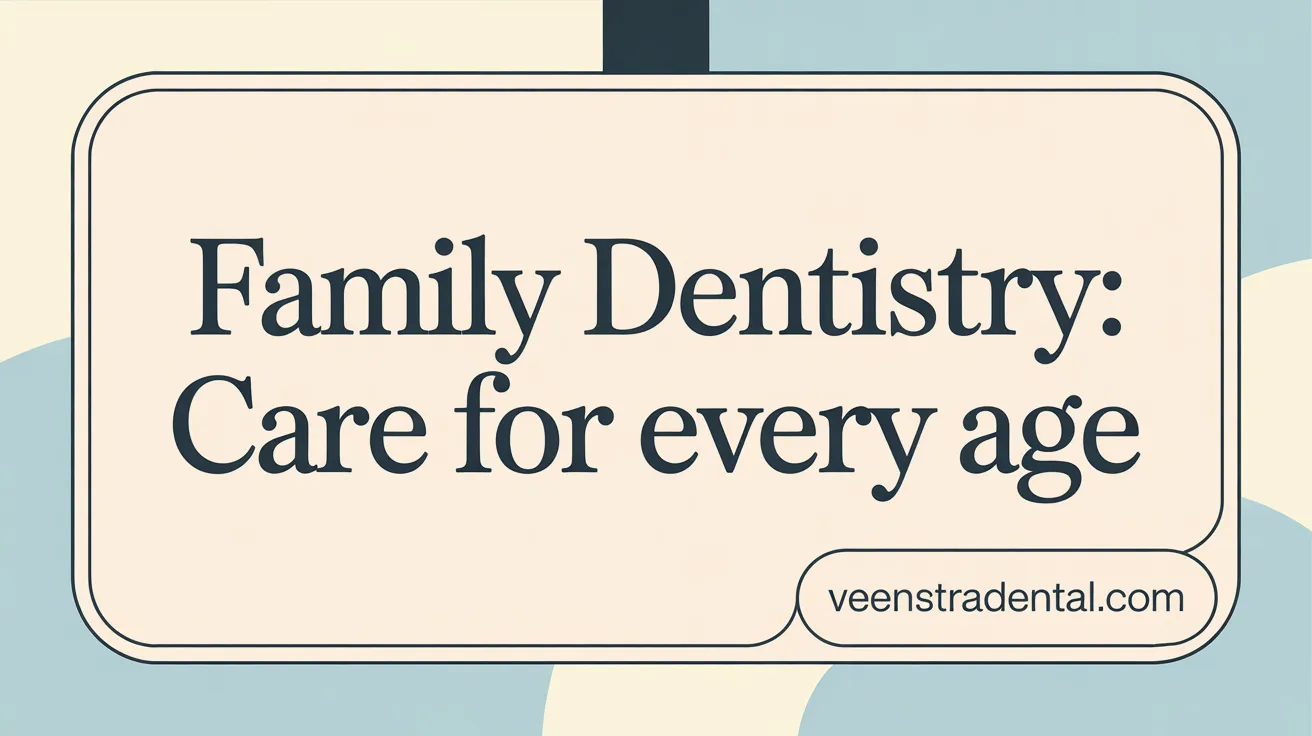Understanding Family Dentistry in Multigenerational Oral Health
Family dentistry represents a holistic approach to oral health care, uniquely positioned to serve the needs of multiple generations under one roof. This comprehensive model offers preventive, restorative, and educational services tailored to the evolving dental needs across the lifespan—starting from infancy and extending well into the senior years. In doing so, family dentistry not only promotes lifelong oral health but also fosters trust, convenience, and personalized care that benefits entire families. This article explores the significance of family dentistry in multigenerational care, revealing how it supports diverse age groups, adapts to unique dental requirements, and cultivates enduring relationships that underpin effective oral health management.
Defining Family Dentistry and Its Multigenerational Importance

What is family dentistry and why is it important for multigenerational oral health care?
Family dentistry is a comprehensive approach to dental care that serves patients of all ages—ranging from infants just beginning their oral health journey, to elderly individuals with age-related dental needs—within a single practice. This model offers the convenience of managing the entire family's oral health under one roof, simplifying scheduling, and ensuring consistent care.
A significant benefit of family dentistry is its focus on preventive care. Regular check-ups, professional cleanings, fluoride treatments, and oral hygiene education are emphasized to support lifelong oral health. These routine visits enable early detection of dental issues such as cavities, gum disease, or developmental problems, which can be addressed promptly to prevent more serious complications.
Moreover, family dentistry tailors treatments to meet the unique needs of each age group. For children, it involves gentle approaches, oral health education, and early orthodontic evaluations. For seniors, it addresses challenges like dry mouth, tooth loss, and oral cancer screenings. This personalized care fosters healthier habits and better health outcomes for the entire family.
Continuity of care builds strong relationships and trust between the patient and the dentist. When families visit the same provider over many years, it creates a comfortable environment that reduces dental anxiety and encourages regular visits. Such trust not only improves patient experience but also enhances the effectiveness of preventive and diagnostic measures.
In summary, family dentistry is vital for maintaining oral health across generations. It ensures that all family members receive personalized, age-appropriate care, supports early intervention, and promotes a culture of lifelong good oral habits—ultimately contributing to overall health and well-being for families.
Supporting Diverse Age Groups: Tailored Care Across Generations

How does family dentistry support and benefit patients across different age groups and generations?
Family dentistry plays a crucial role in providing comprehensive, personalized care that adapts to the unique needs of each family member, regardless of age. For children, dentists prioritize early prevention through fluoride treatments, sealants, and establishing positive habits to prevent cavities and gum disease. Regular visits help monitor growth, identify orthodontic needs early, and reduce dental anxiety.
For adults, family dentists focus on maintenance and addressing issues like tooth decay, gum disease, and cosmetic concerns. They also monitor lifestyle factors such as smoking or diet, which can impact oral health. Continuity with a familiar provider allows for tailored advice and early detection of systemic health links, like diabetes or cardiovascular risks.
Seniors require specialized care for aging-related issues such as dry mouth, gum recession, tooth loss, and managing prosthetics like dentures or implants. Family dentists help navigate these challenges with age-appropriate treatments, oral hygiene education, and systemic health monitoring. The seamless care across generations builds trust, simplifies appointments, and fosters lifelong oral health habits.
What are the specific dental health needs, common issues, and preventive strategies for children, adults, and seniors?
Children’s dental health aims at early prevention, focusing on routine checkups, fluoride treatments, and sealants to combat high cavity risk. Common problems include cavities, early malocclusion, and gum inflammation. Establishing good brushing and flossing habits, along with restrictions on sugary foods, helps lay a foundation for lifelong health.
Adults face issues like cavities, periodontal disease, tooth wear, and aesthetic concerns such as discoloration. They often require regular cleanings, deep periodontal therapy, and cosmetic procedures. Lifestyle choices like smoking, diet, and stress influence their oral health.
Older adults encounter challenges like dry mouth, increased decay at the root surfaces, gum recession, and tooth loss. Preventive measures include fluoride applications, oral cancer screenings, and management of systemic conditions like osteoporosis. Maintaining prosthetics, addressing dry mouth, and regular monitoring are essential to preserve oral function and overall health.
Across all ages, routine dental visits, personalized education, and preventive care—like sealants, fluoride, and early treatment—are pivotal. Modern technology, access to care, and addressing social factors significantly improve health outcomes. Integrating oral health into general health and emphasizing prevention help sustain lifelong oral wellness for families.
Advantages of Choosing a Family Dental Practice

Convenience and efficiency of family dentistry
Opting for a family dental practice simplifies life by providing a one-stop location for all members of the household. This setup streamlines scheduling, allowing families to book appointments for children, parents, and grandparents at the same time, saving valuable time and reducing the stress of coordinating multiple visits.
Long-term relationships and trust
Building a relationship with a single dentist over the years fosters trust and comfort. Such ongoing familiarity helps in understanding each family member's unique dental history, promoting personalized care and better communication. This continuity enables early detection of hereditary or recurring issues, improving long-term oral health outcomes.
Comprehensive services under one roof
Family dental practices offer a wide range of treatments, including preventive care, restorations, orthodontics, and emergency services. Whether it’s routine cleanings, cavity fillings, or orthodontic evaluations, patients can receive all necessary care without switching providers or clinics, ensuring seamless and consistent treatment.
Creating comfortable environments to reduce anxiety
Modern family dental offices focus on creating welcoming, child-friendly, and relaxing spaces. Features such as colorful decor, engaging amenities, and empathy-driven staff help reduce dental anxiety in children and adults alike. Such environment fosters positive experiences, encouraging regular visits.
Personalized care and early detection
Family dentists tailor treatments to match each individual’s needs and age group. Regular check-ups, visual examinations, digital X-rays, and advanced diagnostics facilitate early detection of issues like gum disease, misalignment, or decay. This proactive approach promotes healthier smiles and prevents more complex dental problems in the future. Learn more about early detection and personalized care.
In summary, choosing a family dental practice offers significant benefits including convenience, trust, comprehensive treatment options, a comfortable environment, and early problem detection. These factors contribute to maintaining optimal oral health for every family member, making it a wise choice for long-term dental wellbeing.
Personalizing Dental Care for Multiple Generations
Dental care for families with members of different ages requires a thoughtful, personalized approach. Family dentists tailor treatments to meet the unique needs of each age group, from children just starting to develop oral hygiene habits to seniors managing age-related dental conditions.
For children, early interventions such as sealants, fluoride treatments, and gentle explanations help foster positive experiences and good lifelong habits. Teenagers benefit from orthodontic consultations and guidance on cosmetic procedures, while adults receive comprehensive maintenance, restorative, and cosmetic care tailored to their lifestyle and health concerns.
Utilizing advanced technology enhances the quality of care at every stage. Digital X-rays, intraoral cameras, and laser dentistry improve diagnosis, comfort, and treatment precision for all ages. These tools enable the dentist to detect issues early and provide minimally invasive options.
Building trust is crucial. Family practices focus on creating a welcoming, comfortable environment to ease dental anxiety. Clear communication and empathetic care foster confidence, encouraging regular visits and ongoing oral health management.
Educational initiatives are personalized according to age. Parents receive guidance on supervising children's oral hygiene, while teens learn about the impact of diet and lifestyle choices. Adults and seniors receive tailored advice to prevent decay, gum disease, and other age-specific concerns.
Flexibility in scheduling also plays a vital role. Many practices offer extended hours and convenient appointments to accommodate busy families, ensuring that regular dental visits become an easy part of their routine.
In summary, personalized, multigenerational dental care combines convenience, advanced technology, and age-specific education to meet the diverse needs of each family member, promoting lifelong oral health in a supportive environment.
Promoting Lifelong Oral Health and Health Equity Through Family Dentistry
 Family dentistry plays an essential role in fostering lifelong oral health across generations by offering comprehensive, preventive, and tailored care. It supports health equity by actively addressing disparities in access, education, and treatment, especially for underserved populations such as low-income families, racial and ethnic minorities, and the elderly. These groups often face systemic barriers and social determinants, including poverty, lack of insurance, and limited community resources.
Family dentistry plays an essential role in fostering lifelong oral health across generations by offering comprehensive, preventive, and tailored care. It supports health equity by actively addressing disparities in access, education, and treatment, especially for underserved populations such as low-income families, racial and ethnic minorities, and the elderly. These groups often face systemic barriers and social determinants, including poverty, lack of insurance, and limited community resources.
A family dentist’s long-term relationships with patients enable personalized care, early detection of dental and systemic health issues, and the reinforcement of healthy habits. Regular check-ups, community education, and preventive treatments like fluoride applications and sealants help mitigate the risk of cavities, gum disease, and related health problems, which can otherwise lead to serious conditions such as heart disease and diabetes.
Community outreach initiatives and culturally sensitive education further promote awareness and accessibility, empowering vulnerable populations to prioritize their oral health. By addressing age-specific needs—such as pediatric preventive care, orthodontics for teenagers, and prosthetics for seniors—family practices contribute significantly to reducing disparities and improving health outcomes.
Overall, family dentistry's integrated, patient-centered approach ensures equitable access to care, reduces the burden of untreated oral diseases, and builds healthier communities. This holistic model effectively bridges gaps in healthcare and nurtures a culture of lifelong, preventive oral health for everyone.
The Value of Long-Term Relationships and Education in Family Dentistry

Why are long-term relationships with family dentists important for consistent and effective oral health management?
Long-term relationships with family dentists are essential for maintaining consistent and effective oral health care. These relationships build trust and open communication, encouraging patients to share concerns and adhere to treatment plans. Family dentists gain a comprehensive understanding of each person's dental history, health goals, and hereditary concerns, which helps in early detection of issues like cavities, gum disease, and oral cancers.
Over the years, these ongoing relationships support personalized care tailored to different life stages, from childhood hygiene education to managing age-related concerns in seniors. Continuity also helps in developing preventive strategies that are more effective and cost-efficient, reducing the need for invasive procedures. Moreover, trusted relationships contribute to reducing dental anxiety, especially for children and those with dental phobias, leading to regular visits and better long-term outcomes. In sum, partnering with a family dentist ensures that preventive care is sustained and that problems are caught early, ultimately supporting overall health and wellness.
How does family dentistry educate families about dental health practices across different stages of life?
Family dentistry plays a pivotal role in educating families about proper dental health practices tailored to each stage of life. Dentists provide guidance on early childhood oral hygiene, such as supervising brushing and introducing flossing by age three. They highlight the importance of regular check-ups and preventive treatments like fluoride applications and sealants to reduce cavities.
As children grow, education shifts to topics like orthodontic options during adolescence, dietary choices affecting oral health, and managing habits like thumb sucking. For adults, family dentists emphasize routine care, how to prevent gum disease, and the importance of smoking cessation or diet modifications.
For seniors, education includes managing issues such as dry mouth, gum recession, and the need for dental prosthetics. Throughout these stages, family dentists foster long-term relationships, making education continuous and adaptive, which helps families develop lifelong habits that promote optimal oral health. This personalized, ongoing support ensures that each family member understands how to care for their teeth throughout their lifetime, reducing disparities and systemic health risks.
The Enduring Impact of Family Dentistry on Generational Oral Health
Family dentistry stands at the forefront of multigenerational oral health care, offering a unified, comprehensive approach that nurtures wellness from infancy to advanced age. By addressing the unique needs of children, adults, and seniors through personalized care, preventive strategies, and continuous education, family dentists establish the foundation for lifelong oral health. The convenience and trust fostered by long-term relationships simplify health management and enhance patient comfort, significantly reducing dental anxiety and encouraging positive habits. Moreover, the commitment of family dentistry to health equity and community outreach ensures that vulnerable populations receive quality care, helping bridge disparities across generations. Ultimately, family dentistry’s coordinated and compassionate care not only safeguards smiles but also enriches overall well-being, making it an indispensable pillar of multigenerational health.
